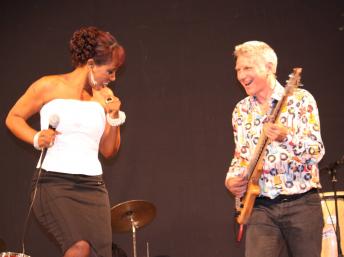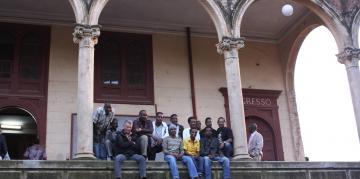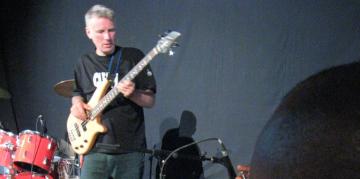
webmaster
© Copyright DEHAI-Eritrea OnLine, 1993-2010
All rights reserved
From: Berhane Habtemariam (Berhane.Habtemariam@gmx.de)
Date: Fri Dec 10 2010 - 08:04:32 EST
Asmara All Stars bring Eritrea out of isolation
<http://telechargement.rfi.fr.edgesuite.net/rfi/anglais/audio/modules/actu/2
01012/2010-52_WT_ASMARA_ALL_STARS_PART_1_Friday_Dec_11.mp3> Listen (25:03)
http://www.english.rfi.fr/aef_player_popup/rfi_player#
By <http://www.english.rfi.fr/auteur/daniel-brown> Daniel Brown
Friday 10 December 2010
In October 2010, the German label Out Here released a 13-track album that
defied pigeonholes, government suspicion and bureaucracy. World Tracks
brings you a two-part special from the official launch in Asmara of
Eritrea’s Got Soul, a collaboration between French musician Bruno Blum and
the Eritrean authorities.
“Eritreans only kneel on two occasions: when they pray and when they shoot.”
This old Horn of Africa proverb reflects a defiant population which has
known little but war and penury for half a century. Since Haile Selassie
shut down Eritrea’s parliament in 1961, the country has been striving to
assert an original heritage, different to its neighbours Ethiopia, Sudan,
Yemen and Djibouti.
“Eritrea, more than almost any country I know,” wrote John Pilger in his
book Heroes, “demonstrated the most incredible self-reliance for year after
year, as its people struggled for their independence.”
“Stubborn, magnificent, soldiering on,” adds Michela Wrong in her 2005 work
I didn’t do it for you: How the world used and abused a small African
nation, “like the winding railway between Massawa and Asmara, restored since
independence.”
This sense of isolated pride is reflected in the music of the Asmara All
Stars.
French blues guitarist, songwriter, producer, music author, painter and
cartoonist Bruno Blum was invited in 2006 by the official Eritrean Cultural
Affairs Office to create a modern yet traditional sound from a country that
has faced a cultural and economic blockade for the past decade.
The outside world knows little about the musical heritage of these five
million people. Eritrea’s international production boils down to three
releases, give or take a few: a Rags Production featuring the nation’s best
exiled musicians, the Ethiopiques N°5 devoted to artists from both sides of
the border in the 1970-1975 era; and the works of Abraham Afewerki, whose
career was cut short in a drowning accident in October 2006.
Blum first came into contact with Eritrean music three months before that
tragedy when he was invited to perform reggae at the local Alliance
Française. The singer then persuaded the Cultural Affairs Office to unite
the country’s best talents and promote them for a western audience.
The album is made up of what he calls “a spirited, tradition-charged
electric music”, blending eight of Eritrea’s nine languages. The exercise
turned out to be anything but straightforward.
“Eritrea is completely different from anything I’ve experienced in the
world,” says Blum in his home in northeast Paris. In his spacious duplex,
artefacts from the five continents surround his instruments and remarkable
record collection; tableaux in psychedelic colours stare out from the
corners of the living room. “Kingston was like Mad Max in a shanty town,
Lagos was like an overcrowded Manhattan at 6pm. On the other hand, Asmara is
like a quiet town in southern Italy in the early ‘60s. People are polite,
educated and trying to recover from the massive trauma of war.”
Perhaps, but the entire population still remains on war footing, even when
it comes to music. Blum collaborated with the government on condition they
allowed him free rein in the album’s musical direction.
Auditions began in October 2008. The likes of saxophonist Tekle Negassi,
pianist Noah Hailemolokot and guitarists Solomon Amanuel and Edwardo Giorgio
were recruited. Blum also insisted on inviting outsiders like Tigre
superstar Ibrahim Goret and singers Sara Teklesenbet and Yosef Tsehaye.
Unlike most of the others, they are not civil servants who are regularly
asked to play for the army.
http://www.english.rfi.fr/sites/english.filesrfi/imagecache/rfi_43_large/sit
es/images.rfi.fr/files/aef_image/eritre%20wt.jpg
Eritrean diva Faytinga and Blum
Asmara All Stars in front of the Cinema Asmara concert hall
Asmara All Stars in front of the Cinema Asmara concert hall
Daniel Brown
Blum on the guitar during rehearsals
Blum on the guitar during rehearsals
Daniel Brown



----[This List to be used for Eritrea Related News Only]----
